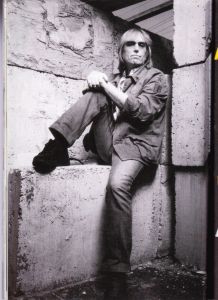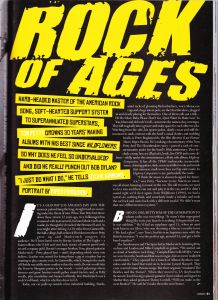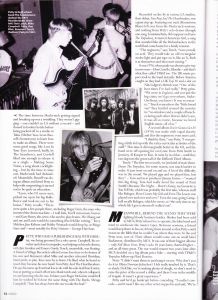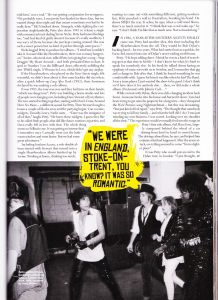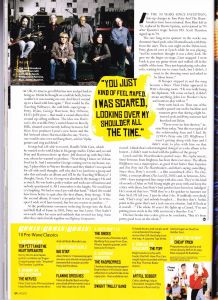Editor's Note: Thanks to Sue Reaney for the scan. Also, this article's got a number of strange errors.
Rock of Ages
By Sylvie Simmons
MOJO - October 2006
Hard-headed master of the American rock song, soft-hearted support system to superannuated superstars, Tom Petty crowns 30 years making albums with his best since Wildflowers. So why does he feel so undervalued? And did he really punch out Bob Dylan? "I just do what I do," he tells Sylvie Simmons.
It's a gloomy Los Angeles day and the anorexic palms lining the long, straight road are cowering under the threat of rain. When Tom Petty first drove down these streets 32 years ago, in a Volkswagen bus crammed with instruments, his band Mudcrutch and a roadie, he thought he'd reached the Promised Land. As you might after driving 2,120 miles from Gainesville, the half-college, half-redneck Florida town where Petty grew up and Mudcrutch outgrew its audience. He'd been lured west by Bernie Leadon of The Eagles—a Gainesvillean who'd left and sent back stories of streets paved with record company gold. Bernie's younger brother, Tom, played guitar in Mudcrutch—Petty played bass—until, depending which story you believe, Leadon was ousted for losing them a gig at a topless bar or wanting to play country rock. In Gainesville, which, being in the north of Florida was oddly more Southern than the south, Bernie would take the Toms to bluegrass parties in the woods—weird gatherings where farmers and game hunters would gather round tractors and, as Petty recalls, play mandolins and banjos brilliantly. But Mudcrutch was a rock 'n' roll band, which is why they drove to LA.
Today, our car pulls up outside a low industrial building. Inside, amid racks of gleaming Rickenbackers, worn Moroccan rugs and a large totem pole, are the Heartbreakers, plugged in and clearly playing for themselves. One of them calls out a title—Hi Ho Silver, Baby Please Don't Go, I Just Want To Make Love To You, blues and old rock 'n' roll—someone else names a key or tempo. They fall magically into a groove and make space for each other to solo. Watching from the side, his sports jacket, dandy cravat and stuff demeanour in stark contrast with the band's casual clothes and nodding heads, is Peter Bogdanovich, the film director (Last Picture Show; Paper Moon). He's making a documentary of the Tom Petty And The Heartbreakers story—part of a rash of commemorative antics for the band's 30th anniversary. They include a tour, box set (Playback), book, live DVD, and a new album—oddly, under the circumstances, a Petty solo album, Highway Companion. It has all the TP&H trademarks: memorable tunes, chiming guitars, dark, sewn-nostrilled vocals and words that summon small-town lives and big ride roads. In Hghway Companion's case, particularly the roads.
"I think the music is almost designed for America," says Petty, "because to me American music was all about listening to music in the car. The old records, we used to do a mix and then run out and play it in the car, and if it didn't sound right we'd do it again. Even Wildflowers [1994], we had a rental car, nothing flash, and somebody made a mistake and took the car back and came back with a different model. We didn't trust that one; different stereo system."
Born in 1950, Petty was of the generation to whom radio was everything: "It wasn't this segregated thing like now, you heard everything. It hypnotised me. It was sublime." He'd had an epiphany aged 11, when an aunt took him to see Elvis, who was shooting a film in a nearby town ("He had a glow," says Tom), but his true baptism came with the British invasion: "I was the perfect age, around 13, and got a little band together."
The Sundowners and The Epics led to Mudcrutch, featuring Petty on bass and Leadon and Mike Campbell on guitars. "We started out as a kind of Southern rock thing," Campbell later tells MOJO, "since we were from the South and that was in vogue, but we never really felt comfortable." They opened for a bunch of Allman Brothers wannabes and the band that went on to become Lynyrd Skynyrd. They even covered Gram Parsons songs. But their originals "emulated The Beatles and the Stones". When they moved to LA (keyboardist Benmont Tench having replaced guitarist Tom Leadon) and signed to Shelter they asked Denny Cordell, "Will you make us the next Beatles?" He said he'd make them the next Stones.
The time between Mudcrutch getting signed and breaking up was a twinkling. They weren't gigging—you couldn't in LA without a record—and dossed in hooker hotels before being packed off to a studio in Tulsa (Shelter boss Leon Russell's hometown) to learn how to make an album. There were some good songs, like Lost In Your Eyes (covered, badly, by The Searchers) and Cordell liked one long enough to release it as a single—Making Some Noise, a song about cockfighting—but by the time it came out, Mudcrutch had disbanded. Meanwhile, Russell was doing an album and hired Petty to help with songwriting; it turned out to be quite an education.
"Leon, who I'd never met, picked me up in his big Rolls-Royce and took me out to his house," Petty recalls. "There were quite a few people there, including Roger Linn, the man who invented the drum machine—I told him, You'll ruin music forever—and Gary Busey, the actor, who used to play drums. We'd hang out and me and Leon would do something if he felt like writing." Terry Melcher, Jim Keltner, and Bobby Womack would drop by, or Ringo Star and—most notably for Petty's future—George Harrison.
Petty, who had a publishing deal with Shelter, was being groomed for a solo career. Campbell, his cowriter and closest compadre, was helping on his solo demos, with Jim Gordon and Emery Gordy. Tench, meanwhile, was floating. A friend at Village Recorders offered some free times to do demos of his own and Benmont called Mike and another relocated Floridan, Stan Lynch, to play. Tom came by to listen. He liked what he heard so much they became his new band: Tom Petty And The Heartbreakers. He says his name up front had less to do with his solo deal than frustration at putting so much effort into Mudcrutch and, when it collapsed, no one knowing who he was. In later years Roger McGuinn would tell him he wished he'd done the same thing with The Byrds. Shrugs Campbell, "Tom has always been the one to take the lead."
Recorded on the fly in various LA studios, their debut, Tom Petty And The Heartbreakers, was a giant step up. Featuring one track (Hometown Blues) left over from the Mudcrutch sessions, and nothing from Petty's solo demos (though one song, Louisiana Rain, did reappear on Damn the Torpedoes), it starred American Girl, a song that sounded like all the Rickenbackers in the world had come home for a family reunion.
"The engineers," says Tench, "were proudly on acid. They would take an old rectangular strobe light and put tape on it, like an X, flash it at themselves and then start mixing."
It was 1976, when punk was about to give way to new wave—Elvis Costello, Blondie—and that's what they called TP&H too. The UK music papers took to the band instantly. Before America caught on they had a UK Top 30 and a slot on Nil Lofgren's British tour. "One of the best times I've had really," Petty grins. "We were in England, and not just the big cities; we'd go everywhere, Stoke-On-Trent, you know? It was so romantic." Tench remembers the "little bread van" they hurtled around the country in: "no windows and a couple of benches facing each other. But we didn't care, it was all so exotic, because we loved English music, all of us."
A second album You're Gonna Get It! (1978) was made with equal alacrity and (for the engineers) even more acid; "I think by then," says Petty, "I was getting a little fed up with the extra-curricular activities of the staff." This time it did marginally better in the US, and the band were off opening for everyone from Patti Smith to Journey, Al Kooper to Kiss. It went by in a blur—until they ran slap into the great wall of the Difficult Third Album.
Tench: "The first two records, we just kind of made them. Damn The Torpedoes, for some reason, was much harder to make. It just went on and on and on. A lot of the difficulty was in the sound. We played gigs and we played fine, but they"—Tom and new producer Jimmy Iovine—"wanted this big thing. Tom had really loved the sound of Patti Smith's Because The Night... But it's funny, my favourite is You Tell Me, which was probably the first take, whereas stuff like Refugee, Here Comes My Girl and Even The Losers was played over and over and over." Even the easy-going Campbell recalls Refugee, which he wrote, as "the only time in my whole life I got so stressed I walked out."
Meanwhile, behind the scenes they were fighting bloody business battles. Shelter had been sold to MCA; Petty refused to co-operate, the label sued and tried to confiscate the master tapes. Between sessions, a friend would keep them in his car, driving them around so that Petty could swear on the Bible that he couldn't say where they were. In the end, Petty won, sort of. Their album would come out on small label Backstreet, distributed by MCA. It was one of their biggest albums—only Full Moon Fever, Petty's solo 10 years later, charted higher—and an all-time great. The war would resume two years later after MCA decided on a big album price hike—starting with TP&H's Torpedoes follow-up Hard Promises.
Petty: "I didn't want them to just hang it on me. Why don't you do it to Olivia Newton-John first? I felt really insulted by it. That's so shady. I felt like, we're making plenty of dough, we don't need to raise the price of the record a dollar, and there I was in the middle of it again. It wasn't a great experience."
Petty said he'd go bankrupt before conceding. "I couldn't concede—and it wasn't like any other artist stepped in and said, 'We're with him,' not a soul." He was getting a reputation for arrogance, "We probably were. I was pretty hot-headed in those days, but we wanted things done right and that meant sometimes you had to be really firm." MCA backed down. Strangely, while fighting the corporation singlehandedly, Petty also chose 1981 to release a single with commercial rock darling Stevie Nicks. Petty had mixed feelings too, "and feel kind of guilty about it because it's really snobbery. I was wary of Stevie because she just kept coming around. She was such a sweet person but we kind of put her through some paces."
Nicks begged Petty to produce her album—"I tried but I couldn't take it. It wasn't like the Heartbreakers, there were so many hangers-on." Iovine, who took over, talked Petty into giving her a song—Stop Draggin' My Heart Around—and both persuaded him to duet. It sped to Number 3 on the Billboard chart, effectively nobbling the new TP&H single, A Woman In Love, which didn't get any airplay.
If the Heartbreakers, who played on the Tom-Stevie single, felt resentful, we didn't hear about it. But some hackles did rise when, after a quick follow-up Long After Dark (1982), their frontman declared he was making a solo album.
It was 1983, the tour was over and they had time on their hands, "which was dangerous." Petty was building a home studio and lots of people were hanging out, including Dave Stewart of Eurythmics. The two started writing together, starting with Don't Come Around Here No More—a different sound for Petty. Then Stewart bought a house a couple of blocks away and the partying began. Cue cocaine, midgets, Timothy Leary, Nudie suits... "Dave was the instigator of all of that," laughs Petty. "He knew these midgets, I guess they like to be called little people, that did like dance routines at parties, and Dave really fell in love with that. The whole thing seems so Fellini to me. It was getting so intense that I remember once I actually went out the bathroom window and went home. But we had some great adventures."
Including Southern Accents, a solo double album started with Stewart that turned into a single Heartbreakers album finished by Iovine. Working at home, drinking too much, wanting to come out with something different, getting nowhere fast, Petty punched a wall in frustration, breaking his hand. He shows MOJO the scar. It aches, he says, when a cold wind blows, there's so much metal in it. "I think that was a real wake-up," he says. "I don't think I'm like that as much now. Not so headstrong."
In 1986, a year after Southern Accents finally came out, Petty had another idea, this time including the Heartbreakers from the off. They would be Bob Dylan's backing band—for two years. What had started as a quickie, for Farm Aid, turned into one of Dylan's never-ending world tours.
Petty: "He kept adding dates. I think he was in a kind of searching spot at that time in his life—I don't know for what, it's hard to speak for somebody else. In his book he talked about having an epiphany of some sort with us in Sweden, and I remember that gig and a change in Bob after that. I think he found something he was comfortable with. I guess for him it was like when he had The Band. I was a team player. I just wanted the show to be good. I don't think we'd have done it for anybody else...then, we did make a whole album (Unchained) with Johnny Cash..."
While on tour with Dylan, there was a life-changing incident back home. Someone broke into his house and burned it down. Fans had been trying to get onto his property for a long time—they'd inspired the Hard Promises song Nightwatchman—but this was devastating. "You just kind of feel raped," says Petty. "The thought that somebody was trying to kill my family—and what the hell did I do? I was just minding my own business. I was scared. Looking over my shoulder all the time." The experience would eventually feed into the songs on Petty's first solo album, Full Moon Fever, largely composed behind the wheel of a car driving from hotel to hotel to rented house. The driving calmed him, he says, and helped him evaluate what happened. After the arson attack, everything seemed to come "from a lighter place."
It was Petty who would put an end to the Dylan tour, in London. "I just thought, OK, it's time to get off this bus now and get back to being us. I think he thought we could do both, but we couldn't, it was wearing me out. And then I wound up in a band with him again." That would be the Traveling Wilburys, the odd little supergroup—Petty, Dylan, George Harrison, Roy Orbison, ELO's Jeff Lynne—that made a casual album that wound up selling millions. The idea was Harrison's, the crucible Petty's rented house in Beverly Hills, situated conveniently halfway between Full Moon Fever producer Lynne's new home and the Bel Air hotel where Harrison liked to stay. "Everyone would come over and hang there, and we'd play guitars and sing and drink."
George had a B-side to record, Handle With Care, which he wanted to do with Dylan in his garage studio. Dylan said yes and Petty and Harrison drove up there. Jeff showed up with Roy Orbison, whom he wanted to produce. "Next thing I know we'd done You Got It. And I remember George coming over to my house, saying, 'I played this to Warner Brothers and they think it's too special for a B-side and I thought, well why don't we just form a group and take this and make an album and it'll be the Traveling Wilburys?' I thought, Great, I'm in. George was absolutely the manager. He said as much. He was leader, policy-maker and took care of business and nobody questioned it. All I remember is the laughs. We would just cry laughing. We had so much joy with that band." Asked if it would have been better to quit after the first album, Petty shrugs. "I like the second album. It wasn't as popular but it was good. In retrospect I wish we'd have toured, but for one reason or another..."
At the posthumous ceremony inducting George into the Rock and Roll Hall of Fame in 2003, Petty ran into Lynne. They hadn't seen each other for years and suddenly that seemed too long. Soon after they started work together on Highway Companion.
In the 30 years since inception, line-up changes in Tom Petty And The Heartbreakers have been minimal. Ron Blair left in '82, replaced by Howie Epstein, and rejoined in '93 after Epstein's tragic heroin OD. Scott Thurston signed up in '91.
The one long-term spanner in the works was drummer Stan Lynch, who'd butted heads with Petty from the start. Then, one night on the Dylan tour, Petty glanced over at Lynch while he was playing, "and he somehow thought it was a dirty look. He gave me the finger on-stage, I just snapped. I went Fuck it, put my guitar down and walked off in the middle of the tune. They just kept playing, solo after solo, waiting for me to come back, but I didn't, I went to the dressing room and asked to be taken home."
Al Kooper stepped in and the song became a blues. Then Dylan appeared in Petty's dressing room. "He was really being the diplomat, 'Oh, come on back, it didn't mean anything, John Lee Hooker's here and wants to play with us.'"
Petty went back on. Then one of the roadies passed out on the backline and rumours grew that during a fight between Lynch and Petty, someone had knocked out Dylan.
"There were no fists thrown," insists Petty today, "but this was typical of the relationship Stan and I had. By [1994's Petty solo LP] Wildflowers I wasn't getting along with Stan and I didn't want to play with him on that record. I think that's what instigated during it as a solo album to be honest—I didn't want to deal with the politics of the group."
Lynch and the Heartbreakers parted ways. His replacement, Steve Ferrone, from Brighton, has been there ever since. The album Wildflowers was a masterpiece, as good if not better than Torpedoes and Tom Petty And The Heartbreakers, and that's saying something. Since then, Petty's records—a film soundtrack (She's The One, 1996), a concept album (The Last DJ, 2002) and, in between, Echo, 1999—have juxtaposed fine songs with also-rans. They're the kind of records a Dylan or Neil Young might get away with and keep the critics with them, but Petty's bad patches have been less indulged. He's noticed that too: "Well, they're a lot quicker to hammer me than Neil, I'll tell you. I just do what I do. If suddenly everybody said, 'That's crap,' and nobody bought it... But they don't. At this point in the game that's not a real concern of mine. And if I look at it overall..." The whole 30 years? He lights up a Camel, "I'm not putting more stock in the 30th anniversary than the 31st."
He face breaks into a slow grin as he concludes, "But it's been pretty good to us on the whole."

